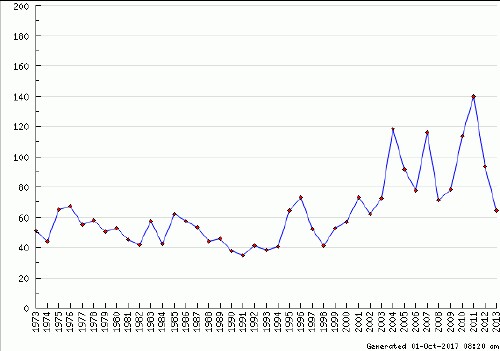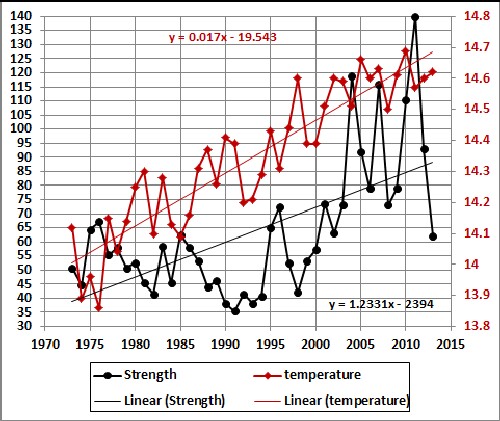
L. David Roper
http://www.roperld.com/personal/roperldavid.htm
1 October, 2017
Recent studies have shown that earthquakes and volcano eruptions are suppressed when ocean water becomes ice/snow on land in the arctic regions and as glaciers everywhere. Ice is heavy and depresses the Earth wherever it is formed. When it melts rapidly, such as is the case during global warming, the suppressing of earthquakes and volcano eruptions is lessened. Of course, the melting of ice on land also increases the sea level.
Also, it may be that increased heat in the Earth and oceans due to global warming increases the probability of slippage, causing an increase in earthquakes.
Lindquist has collected data for earthquakes since 1973:

The vertical axis is total strength of all earthquakes.
The following graphs show the yearly total earthquake strength vs global average land temperature and vs sea-level rise.
 |
Since sea-level-rise data are not available for every year, I use a linear fit to the data, which is a good representation. |
The correlation matrix for the three variables is
Correlations: |
Earthquakes |
Temperature |
Sea Level |
Earthquakes |
1 |
0.529 |
0.615 |
Temperature |
0.529 |
1 |
0.909 |
Sea Level |
0.615 |
0.909 |
1 |
There are good physical reason why earthquakes increase in strength as sea level rises. The correlations of ~0.5 for yearly earthquakes total strength with global average temperature and sea level rise supports the theory of increasing strength of earthquakes due to global warming.
The increase in volcano eruptions due to higher atmospheric and ocean temperatures melting land ice can have a negative feedback on Earth average temperature if the plume goes high into the stratosphere into the atmosphere.
L. David Roper interdisciplinary studies
L. David Roper, http://www.roperld.com/personal/roperldavid.htm
1 October, 2017